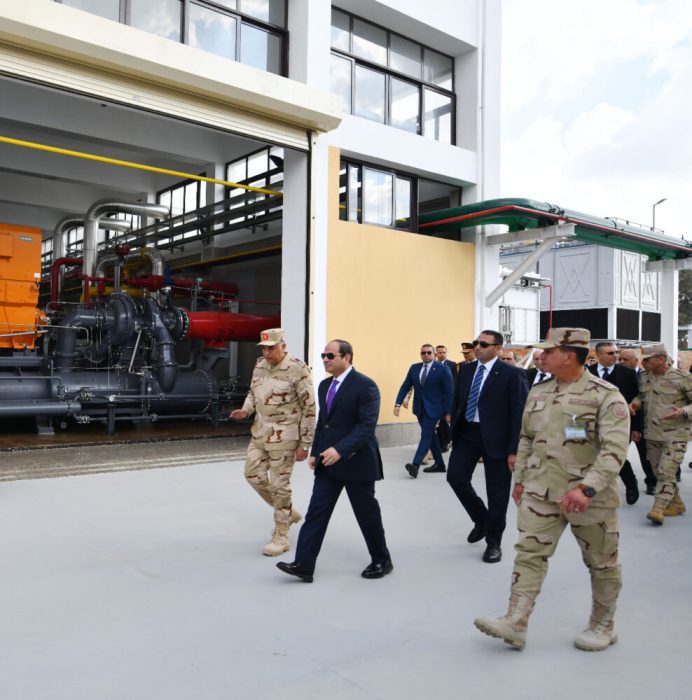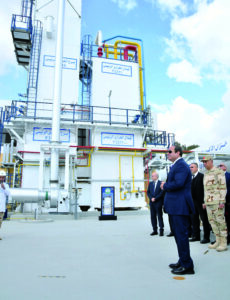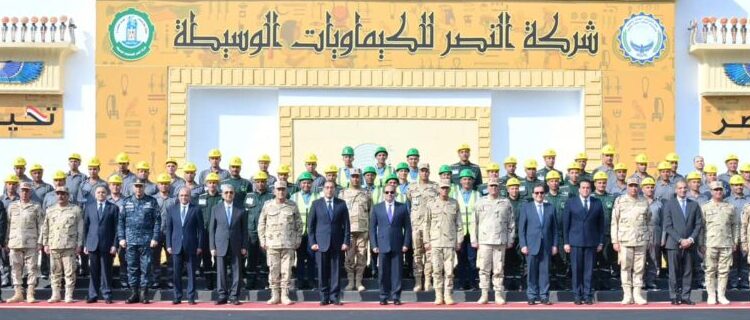Egypt’s President Abdel Fattah El Sisi affirmed on Monday that the state was keen to enhance domestic production of strategic products and commodities, as well as those imported from abroad to ease pressure on the US dollar.
In statements during the inauguration of medical and industrial gas factories and the tri-generation plant in the chemical industrial complex in Abu Rawash in Giza yesterday, President Sisi called on the government to announce the volume of goods that will be released at the ports, noting that Prime Minister Moustafa Madbouli presented him with a plan to release the commodities from the ports and ways to provide the necessary funds for that.
The president added that the Egyptian banks will cover the funds to secure the release of some goods in the ports, stressing the importance of providing data to citizens. He noted that the lack of data provides an opportunity for rumours.

President Sisi said that the state has been seeking to produce some strategic industries such as chlorine and medical gases to meet the local demand.
He added, “The medical gases in Egypt were sufficient for us, but the challenge of the spread of coronavirus forced us to establish factories to produce these gases.”
The president stressed that the opening of these factories would enable the state to cope with all developments in the medical sector that could happen in the coming years.
President Sisi continued, “We are seeking to meet the local needs of hydrogen,” stressing at the same time that the state was keen to achieve stability in the agricultural sector.
President Sisi called for solidarity to confront the rise in the prices of commodities and alleviate the suffering of citizens.
He affirmed that he is being completely honest with Egyptians since assuming office and discussing everything with them so they would be able to know the complete truth regarding the economic situation in their country.
He also noted the recent controversy raised toward establishing the Suez Canal Authority fund which was approved in principle by the parliament last week.
President Sisi offered assurances that the proposed Suez Canal investment fund will be overseen by the county’s oversight bodies under the charge of a “sovereign apparatus.”

“The government had to establish this fund to provide a specialised source for the canal to enable it to participate in projects or spend more on development without the need to turn to the Ministry of Finance” Sisi said.
The president explained that the entry of the Suez Canal Fund Draft Law into Parliament gave it legal and sovereign immunity, noting that “no one can approach the state’s private funds without my direct approval”.
Sisi said that the fund in reality is a ‘dream’ that will enable the authority to have its privet funding channel; however, he directed that all draft laws “must be discussed even before presenting it to the Parliament to prevent the spread of fear and rumours”.
“Fear is normal, Egyptians wanted to assure that nothing is going to be misused and that is why the law should’ve been discussed earlier.” Sisi said.
The president said that the nitrogen fertiliser complex, which is scheduled to be opened during the coming period, will keep pace with the increase in agricultural areas.
He stressed the need to work on finding solutions away from the state’s general budget.
The president stressed the need for saving pots with the various ministries and agencies, citing the Suez Canal Fund, noting that the canal’s revenues amounted to $220 billion since 1975 until now.
He also pointed out that 10 per cent of that revenue could have been deducted and placed in a fund that could have been used to finance the projects of the Suez Canal Authority and development in the canal.
President Sisi cited the Ministry of Health and Population Fund, which was established to finance projects and raise the efficiency of hospitals in light of the rise in demand and cost in the health sector, in addition to the Ministry of Housing Fund, through which liquidity is provided to establish one million housing units annually.
President Sisi touched on chlorine gas, saying that “the developments taking place in the world at the present time have caused instability in contracts and thus led to an increase in the prices of materials and raw materials that were contracted during the last period”.
The president referred to the negative impact of supply chains disruptions during the past three years due to the coronavirus pandemic and the Russian-Ukrainian war, stressing the need to rely on local production of some products that the state cannot dispense with.
He explained that any project may take a period of three to four years to be established, stressing the state’s keenness not to import some products and materials from abroad in order to reduce the demand for the dollar.
President Sisi affirmed that the state is keen to achieve full self-production of all materials that cannot be dispensed with in Egypt, and this is for several reasons, including solving the unemployment problem.






Discussion about this post